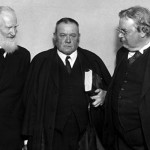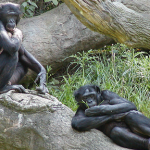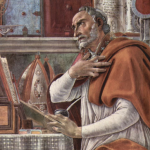Before anything else there is God, absolutely simple and unique, utterly exhausting his own potentiality, totally free, impassible, immaterial, transparent to himself.[1] God first of all is, and his being determines the being of everything else. There could be no fuller answer to the question “What is?” than “God.” In God’s perfect possession of the highest actuality, his being lies open to itself, and communicates itself to itself in an eternal relation of knower and known. The divine essence as the principle of knowledge bears fruit internally in an inner idea or word which exhausts and is who he is, so that both the principle and the word are one God, but differ really by the relation of opposition between them. God alone participates in this perfect immediate and exhaustive intelligibility, which is made more excellent still by its infinity and eternity, so that already we can see an intrinsic superiority in the divine openness to being known that no creature could surpass.
The Word, then, is the perfect image of the invisible God and this perfection manifests and affirms itself in the Divine self-love which terminates in the person of the Holy Spirit. But the primacy of God’s inward intelligibility is manifested further in relation to created things. God in knowing himself perfectly knows also all the possible acts to which his power extends, and knows them infinitely in all their effects and relations and so on, so that within himself God contains the perfect idea which acts as the exemplar of every created thing. This is to say that the inward intelligibility of creatures is merely a participation in the primary and infinite intelligibility of the Godhead. To know a created thing, however perfectly, is merely to grasp at a shadow cast by the light of the Divine Ideas. This notion does not collapse into Platonism, since we are not saying that every species of thing is simply a (deficient) variation on some eternal form, but rather the divine ideas include each particular contingent thing, the course of its existence, etc., and contain it fully, in relation to all other things, as a manifestation of the divine perfection which surpasses all understanding. What God knows primarily is himself, and secondarily he knows all created things in himself as extensions of his power. But God’s knowing something as it is is the cause of its being so, which means that the Divine Ideas are the cause of creation, not only formally as exemplar, but also efficiently as the source of their existence.
We call the pre-existing order of creatures in the mind of God “divine providence”, and the execution of that order in the things themselves “divine government.”[2] Because providence ordains that things should exist in varying degrees of perfection, and because the plurality and diversity of things implies a hierarchy of causes in the created order, the action of the higher on the lower mirrors in a finite way the action of God on creatures, so that each microcosm of creatures is analogically representative of the divine mastery over creation. This also means that the providential unfolding of worldly events is fulfilled in the action of creatures on each other. Though God sustains the world in existence by knowing it, and directly infuses the act of existence into every being from moment to moment, the order among creatures is really present in them and not simply extrinsically imputed to them by divine ordinance. Providence is not fate: the unfolding of events does not happen randomly by a divine fiat, but works through the natures of things, so that by each creature’s natural inclination toward its end, the whole universe tends toward its consummation in Christ, the eternal Word.
Thus, since the act of being of each creature is immediately supplied by God, the government of the universe is immediate, but because God sets some things over others as causes, which impel each other toward their ultimate end, the government of the universe is also mediated by other creatures, and comprehends in that mediation the entire manifold of created things. Thus we can see that God, who gives the light of intelligibility (which is a participation in the divine ideas) to every creature, also gives this light in such a way that they communicate it to each other, “as a master, who not only imparts knowledge to his pupils, but gives also the faculty of teaching others.”[3] And, since the order and distinction of things is from God, and unfolds in accord with providence, eternally pre-existing in God, any created knowledge of things finds its principle and end in that same eternal ordinance by which the world was created, is sustained, and draws toward its fulfillment.
[This post is excerpted from my recently-completed M.A. Thesis, more of which can be read here.]
[1] In order to spare the reader a barrage of useless citations, suffice it to say that this post is a very rough summary of Aquinas’s Summa Theologiae, Ia qq.1-46 and 103.
[2] Cf. ST Ia q.22 a.3 co.
[3] ST Ia q.103 a.6 co.
[Image of a Galaxy from Wikipedia]













